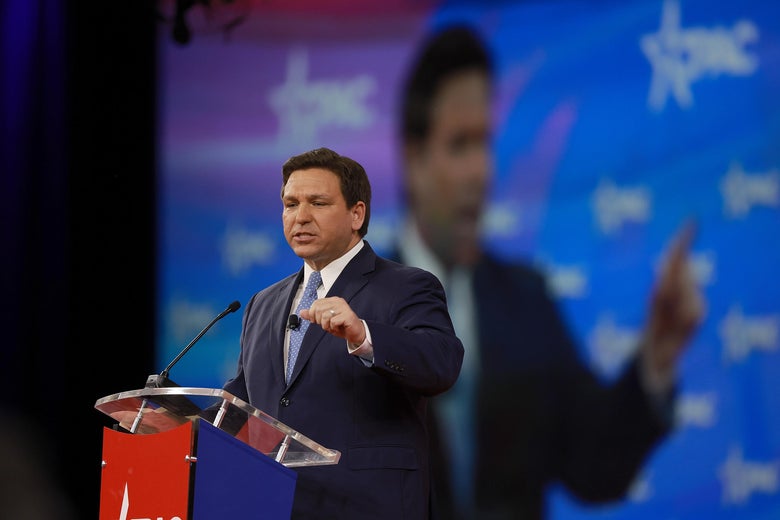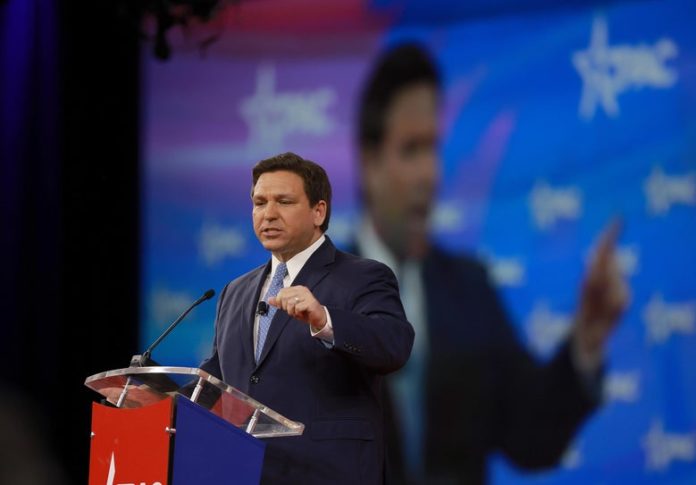
In the week since Florida lawmakers passed H.B. 1557, dubbed the “don’t say gay” bill, the law’s most prominent supporters have refused to publicly tell the truth about what the measure actually says. According to the law’s sponsors and cheerleaders, H.B. 1557 is a simple ban on teaching very young students about sex. It is needed, they say, to prevent “groomers”—specifically, gay and trans teachers—from attempting to corrupt and indoctrinate children with explicit classroom materials. The “don’t say gay” moniker, they insist, is misleading: Teachers and students can still talk about LGBTQ issues; they just can’t force 8-and-unders to learn about gay sex and gender transition.
Advertisement
This framing of H.B. 1557, which Republican Gov. Ron DeSantis is expected to sign into law, is, objectively, a lie. It is refuted by the text of the bill itself, as well as its legislative history, which shows that Republican lawmakers rejected efforts to turn the measure into a straightforward prohibition on sex education in early grades. In reality, H.B. 1557 uses intentionally vague language to outlaw a huge amount of speech about LGBTQ people, families, and issues—not just sex—in every grade. And it relies upon a vigilante enforcement mechanism to chill an even broader amount of speech by subjecting violators to humiliating investigations and ruinous lawsuits. The fact that H.B. 1557’s supporters lie about these basic facts suggests that they know their bill is indefensible and must conceal its true meaning to drag it over the finish line.
Advertisement
Advertisement
Advertisement
Advertisement
Advertisement
At every turn of the legislative process, Republican lawmakers and commentators have misrepresented this bill. During floor debates in the Florida House and Senate, a stream of GOP legislators asserted that the bill would merely expand parents’ rights and limit young children’s exposure to graphic sexual instruction at school. Ben Shapiro said the measure is devoted to “protecting small children from the predations of adults,” dismissing any other interpretation as “propagandistic lies.” Conservative media figures are all reading from the same script, accusing Democrats and mainstream media of exaggerating the law’s purpose and effects. On the far end of the spectrum, Christina Pushaw, DeSantis’ press secretary, called H.B. 1557 the “anti-grooming bill,” claiming that anyone who opposes it is “probably a groomer.”
Advertisement
Set aside, for now, this revival of the odious myth that gay people prey on children, attempting to “convert” or “recruit” them into homosexuality, then molesting them. Instead, to puncture these lies, let’s look at the words that Republican legislators used when drafting H.B. 1557. Unlike tweets, articles, and speeches in defense of the bill, words are the law, and they are worth reading closely.
Claim No. 1: H.B. 1557 only applies to very young children.
Advertisement
Proponents of the law unfailingly center this assertion in their defense of the bill. H.B. 1557, they say, is an effort to shield children ages 4 through 8 from sex education, and from any acknowledgment of LGBTQ families. This claim is easily dispatched with a quick look at the relevant provision, which states:
Advertisement
Advertisement
Classroom instruction by school personnel or third parties on sexual orientation or gender identity may not occur in kindergarten through grade 3 or in a manner that is not age appropriate or developmentally appropriate for students in accordance with state standards.
Advertisement
Advertisement
Note the word I’ve emphasized: “or.” This word is disjunctive, meaning it separates different things. Here, it separates two groups of students to whom the law applies. The first group is students “in kindergarten through grade 3.” The second group is the remainder of “students” with no grade limitation—so grades 4–12.
The bill applies two different rules for these two different groups. For the first group (grades K–3), it imposes an absolute ban on “classroom instruction … on sexual orientation or gender identity.” For the second group (grades 4–12), it imposes a partial ban, outlawing instruction that is “not age appropriate or developmentally appropriate … in accordance with state standards.” (It is unclear which “standards” the bill refers to—more on that soon.)
Advertisement
Advertisement
Advertisement
To understand this point, think about a hypothetical bill that says: “No person shall consume alcohol who is under 21 or over 21.” Imagine if the sponsor said: “My bill reinforces the ban on underage drinking.” That would be partly true, because it does forbid alcohol consumption under the age of 21. But, of course, it also forbids alcohol consumption over the age of 21. By ignoring the text after the disjunctive, the sponsor has elided the fact that their bill applies to everyone, not just minors. H.B. 1557’s proponents are playing a similar trick—although, to state the obvious, alcohol consumption can harm minors, while a reference to LGBTQ families does not.
Claim No. 2: H.B. 1557 only applies to sex education.
Advertisement
Republicans slipped this measure into a broader package ostensibly aimed at expanding parents’ control over their children’s education in public schools. They framed it as a limitation on sex education, but, ironically, it does not target explicit sexual materials. Rather, the bill bans “classroom instruction … on sexual orientation or gender identity” while saying nothing about instruction about the act of sex itself.
Advertisement
So what speech, exactly, does the law censor? The answer hinges on the preposition on. Here, again, a hypothetical is helpful. Imagine a bill that bans classroom instruction “on” slavery. A reasonable teacher would know that any overt mention of slavery is out. They would probably assume, too, that identifying someone as an enslaved person, or noting that someone owned slaves, would be forbidden. A discussion of the abolition movement would have to exclude any reference to its actual goals. Ditto for the 13th Amendment. Any instruction that touches on slavery would be suspect, best avoided to forestall career-ending consequences.
Advertisement
Advertisement
The same goes for instruction on LGBTQ families and issues: Any speech that touches upon this third rail might trigger a complaint. Could a third grade teacher read the children’s book Heather Has Two Mommies in class? Surely not, even though its gentle illustrations are the furthest thing imaginable from sex education. In advance of Parents Day, could the teacher talk about her two adoptive fathers? Definitely not. During a discussion of civil rights heroes, could the teacher talk about trailblazing feminist lawyer Pauli Murray, a gender-nonconforming queer person? It would be a close call. What if they/them pronouns confused students and required an explanation? The teacher might have to explain Murray’s gender identity—and that, no doubt, is illegal.
Advertisement
The terrain gets even rougher in grades 4–12. H.B. 1557 does not clarify which “state standards” educators can use to decide if LGBTQ-related speech is “age appropriate or developmentally appropriate.” There are currently no statewide standards governing LGBTQ instruction, so teachers just have to wing it. If an eighth grade teacher assigned President Barack Obama’s second inaugural address, could they explain his reference to “Stonewall”? Could an 11th grade course about the Supreme Court mention Obergefell v. Hodges, the decision legalizing same-sex marriage? Would an explanation of Obergefell be “developmentally appropriate” for 16-year-olds? What rational teacher would dare take the risk, knowing the potential ramifications?
Advertisement
Advertisement
Advertisement
Advertisement
If Republicans wanted to avoid these difficult questions, they could have clarified that they meant to restrict sex education, not LGBTQ-related speech. But they didn’t. And when a Democratic legislator proposed an amendment replacing the current text with a ban on discussion of “sexual activity,” Republicans voted it down.
Advertisement
H.B. 1557 does not outlaw sex ed. It erases LGBTQ families.
Claim No. 3: H.B. 1557 does not suppress free speech.
It is impossible to understand the scope of this bill’s censorship without looking at its convoluted enforcement mechanisms. The law requires school districts to “adopt procedures for a parent to notify the principal” if they have “concerns” about LGBTQ instruction, and to create a “process for resolving those concerns within 7 calendar days.” If the “concern” is not “resolved” within 30 calendar days, the school district must explain why. A parent can always file a complaint if the concern is not resolved to their satisfaction. The Florida commissioner of education then appoints a special magistrate to recommend a “resolution,” which the state Board of Education must approve or reject. DeSantis is currently stacking this board with far-right allies; his most recent nominee, Esther Byrd, has previously indicated her support for QAnon, the Proud Boys, and the Jan. 6 rioters.
Advertisement
Aggrieved parents have a more direct option: They can sue the school district. If a court agrees that an instructor violated the law, it may issue an injunction, damages, and attorneys’ fees to the parents. This award could run well into the tens of thousands of dollars and almost surely result in the termination of the offending teacher. With this vigilante scheme, Florida has copied from Texas’ playbook, empowering private citizens to enforce oppressive laws through direct legal action.
Even if no parent ever sues under H.B. 1557, the threat of enforcement will hang over school districts. Just as doctors stopped performing abortions when Texas passed S.B. 8, teachers will stop mentioning LGBTQ issues once this bill takes effect. That’s the point: The law has a chilling effect on speech, frightening educators into silence. A parent can ruin teachers’ lives by filing a complaint or a lawsuit; even if a teacher is ultimately exonerated, they will have suffered through an intrusive investigation and faced accusation of misconduct—or “grooming”—that will never fade away completely. Many reasonable educators would rather stay quiet than risk a months- or yearslong probe into their classroom speech, one that may well end in their dismissal or, at a minimum, a permanently stained reputation.
H.B. 1557’s proponents are correct that the bill does not use the word gay. But this reductive defense exploits the measure’s unusual structure to obscure its inevitable impact. If the law were defensible on its own merits, Republicans would not resort to these facile lies when making the case for its passage.







